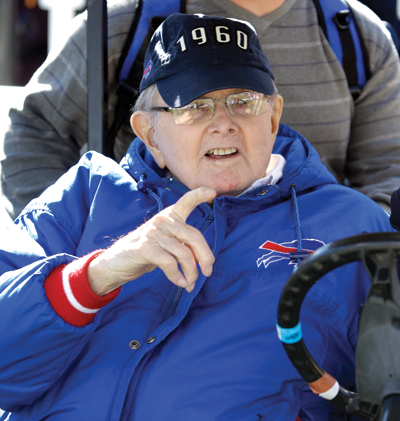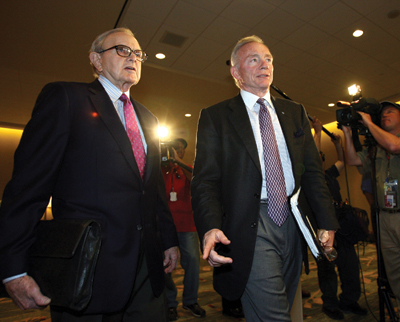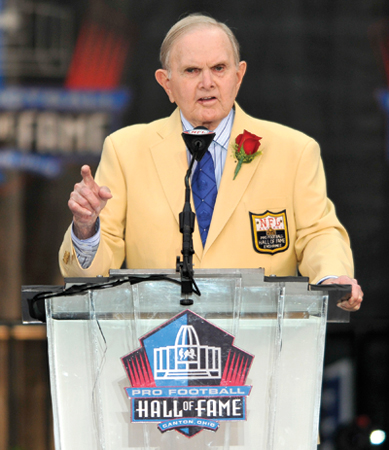On the morning last week after telling his NFL peers that Buffalo Bills founder and owner Ralph Wilson had died, Russ Brandon, the team’s president, was trying to work out. His hope, he said, was that it would be sort of a spiritual exercise, a way to distract himself from the sadness of losing his friend and mentor.
 |
The Bills played their first season in 1960.
Photo by: AP IMAGES
|
It didn’t work. Wiping his forehead afterward, Brandon said he’d had no such luck losing himself through exertion. And then he trudged off, sadly, making his way through the hotel lobby in his sneakers and shorts.
It is Brandon who for now looks to be the face of the franchise, at least until the team is sold from Wilson’s estate. That process itself could take a year, if not more. Jeff Littmann, the team’s chief financial officer — who has worked in Detroit out of corporate offices where he also managed other businesses for Wilson — will oversee the trust handling the team and, ultimately, its sale.
Principally, everyone wants to know what will happen to the Bills: Will they stay in economically challenged Buffalo? For the moment, the answers to questions about the team’s future ownership and its future home are all unknowable, even though rumors were already rampant last week. On the night that Wilson died, at the bar of the Orlando Ritz-Carlton hotel where the owners had gathered for their annual meeting, one football source loudly insisted that Buffalo Sabres owner Terry Pegula would be the guy — but of course, right now, it’s too soon.
What is known is that the Bills’ 10-year lease, signed last year, makes it hard to move the club until 2020. Until then, the team would face a $400 million payment for leaving. After a one-year respite, when the penalty drops significantly, it would again become onerous to depart the last three years of the lease. In return, the state of New York agreed to help fund a $130 million renovation of Ralph Wilson Stadium, one of the lowest revenue-producing venues in the league.
 |
Wilson with Cowboys’ Jerry Jones in 2006
Photo by: AP IMAGES
|
Wilson, who was 95, always bore conflicted feelings about the surging growth of the NFL. He famously had founded the Bills in 1959 by paying $25,000 to help start the American Football League. He even loaned $400,000 to the Oakland Raiders to keep them afloat in the early years of the league, which ultimately would merge with the NFL in 1970.
By the 2000s, it appeared the league was leaving Wilson behind in Buffalo. Speaking to SportsBusiness Journal in 2005, Wilson said he did not understand why so many new stadiums had to be built, and he said he saw no problem with a team playing in his stadium. The problem with the league’s growing revenue disparity between clubs at the time, he said, was caused by new stadiums. And he took deep umbrage at comments made by Dallas Cowboys owner Jerry Jones that lack of marketing was the problem in places like Buffalo.
Fast forward to the present, and the bulk of the issue that gripped Wilson a decade ago has vanished, due in large part to the 2011 collective-bargaining agreement, which shifted a great deal of resources from the players to the owners and has helped to diminish the disparity between clubs. And, with the continued growth of the league’s national TV contracts, the percentage of shared revenue in the NFL is approaching 85 percent, meaning Buffalo can compete with clubs in larger markets.
In 2006, Wilson and Mike Brown, the Cincinnati Bengals’ owner, were the only two votes against that year’s CBA, a deal the league’s other owners ultimately would turn against as well. Within two years of the 2006 vote, the owners opted out of the agreement, setting the stage for the 2011 lockout.
Coming out of the 2006 meeting in the basement of the Dallas airport hotel where the owners approved the CBA, a reporter asked Wilson why he voted no.
 |
Ralph Wilson was inducted into the Pro Football Hall of Fame in 2009
Photo by: AP IMAGES
|
“I didn’t understand it,” he said.
Many laughed at that comment, convinced the NFL had passed him by. But while his beloved Bills never regained their 1990s form on the field — a period marked by four consecutive AFC championships — Wilson would prove a lot smarter than many understood that night with his no vote.
Asked last week if he ever spoke with Wilson about feeling vindicated by their votes that year, Brown laughed at the question.
“There is not much vindication around here,” he said.
Last week, there might not have been any vindication for having the foresight to buy the Bills, start the AFL or vote against the 2006 CBA — but there was clearly among NFL owners a great deal of sorrow and much respect for the passing of one of the league’s ownership greats.






